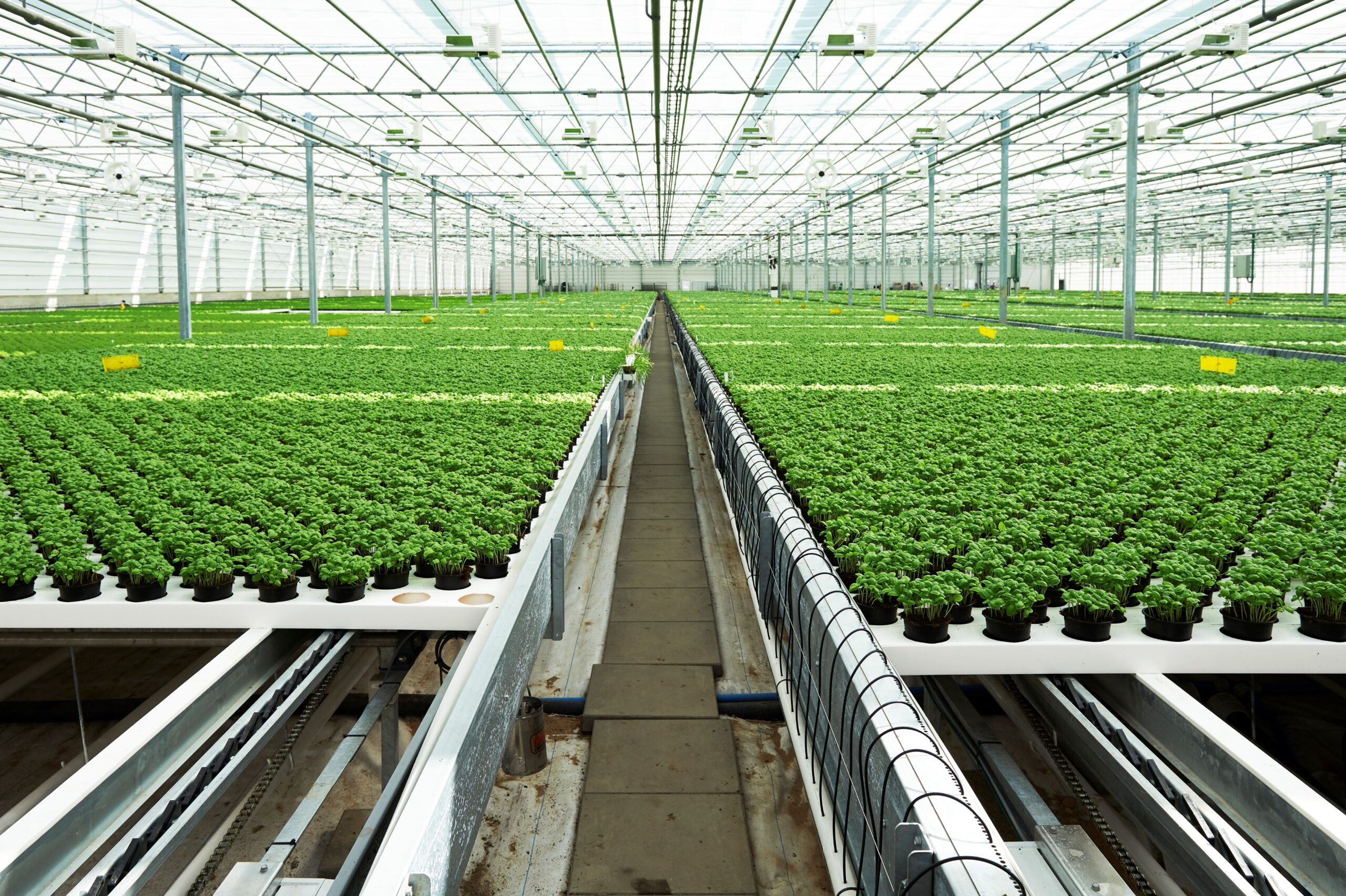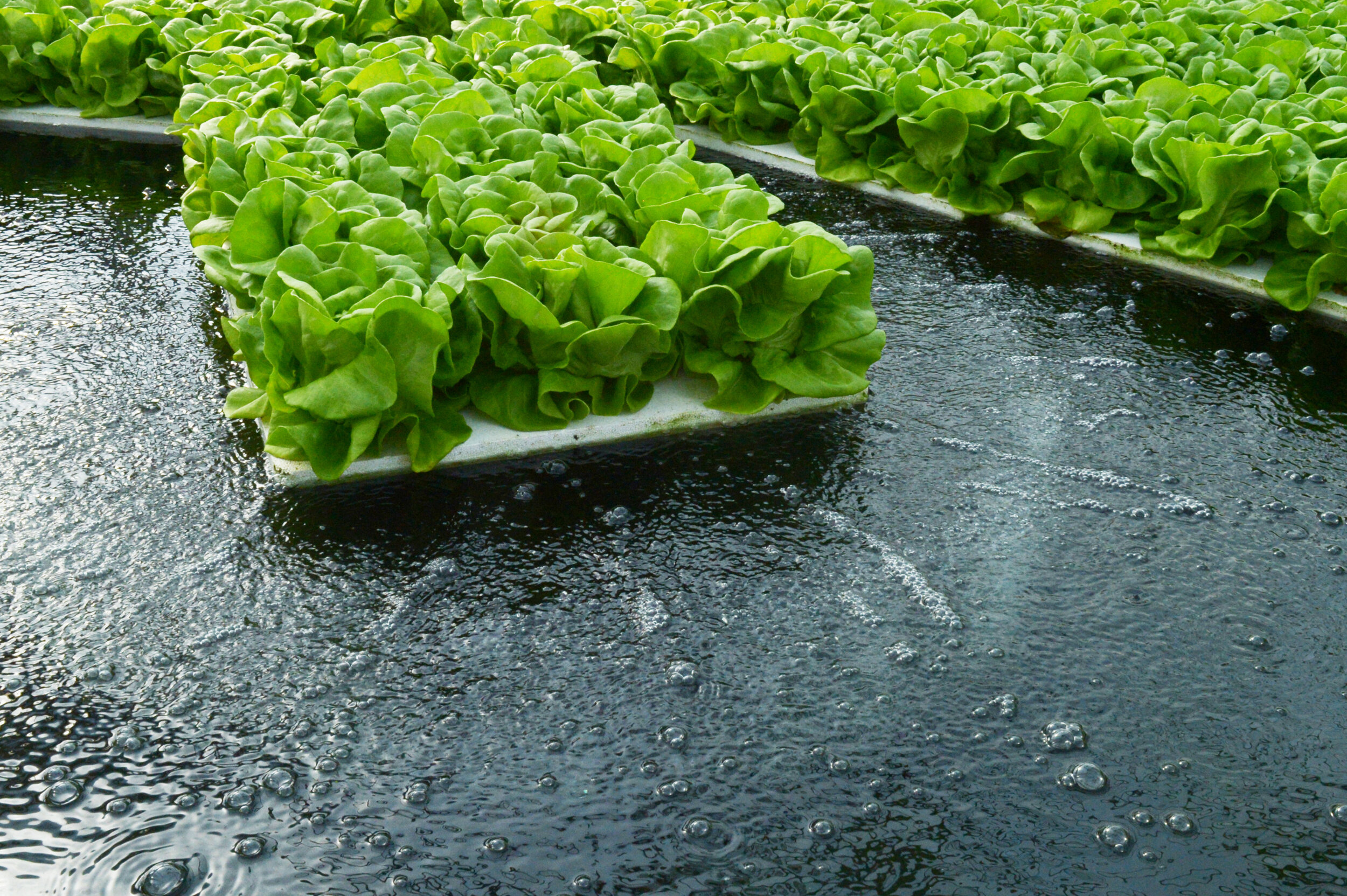Exploring the Innovations of Horizontal Farming
Horizontal Farming traditionally involves cultivating crops on flat land, usually in large outdoor fields or plots. This conventional method involves planting crops directly into the ground and employing machinery for tasks like planting, irrigation, and harvesting.
In the context of Vertical Farming, Horizontal Farming takes on a different meaning. It often refers to the use of large indoor greenhouses with extensive bench sections designed to automate the movement of plants for cultivation. At Viemose DGS, we have extensive knowledge of the systems of Horizontal Farming.
These sophisticated systems include various setups, including Moving Gutter Systems, Mobile Gutter Systems, and pond systems like Deep Water Culture. This article will explore each of these distinct cultivation systems.
Horizontal Farming is mostly used in Hydroponics
While any agricultural method not involving Vertical Farming is commonly termed horizontal, the usage of the term has mostly been associated with hydroponics.
Hydroponics involves plant cultivation without soil, where roots grow either in inert materials, absorbing nutrients from circulating solutions, or are directed towards such solutions while inert materials are solely used for support. In contrast to Vertical Farming, which incorporates multiple plant levels within a given land area, Horizontal Farming typically operates on a single layer.
Moving Gutter System in the context of Horizontal Farming
In the context of Horizontal Farming, Moving Gutter Systems are a type of cultivation setup where gutters are utilized to transport plants horizontally within a greenhouse or growing facility. These gutters are designed to move along a track or rail system, enabling automated movement of the plants.
Plants are typically grown in containers or trays placed within these gutters. As the gutters move, they carry the plants along, ensuring each plant receives optimal exposure to light, water, and nutrients. This movement mechanism helps to maximize space utilization and ensures uniform growth conditions for all plants within the system.
Moving Gutter Systems are particularly useful in situations where space optimization and efficient cultivation practices are paramount, such as in Vertical Farming setups. They contribute to the overall efficiency and productivity of the farming operation by facilitating automation and providing consistent growing conditions for the plants.

Mobile Gutter Systems
Mobile Gutter Systems employ gutters or channels for cultivating plants, but with a distinct mobility approach. In these systems, the entirety of the greenhouse or cultivation area, including the gutters, is designed to be movable.
This flexibility enables growers to reposition the entire system, including both gutters and plants, within the growing space as necessary. Such adaptability allows for dynamic adjustments to the layout of the cultivation area, optimizing space utilization and promoting efficient cultivation practices.
In essence, while both Moving Gutter Systems and Mobile Gutter Systems utilize gutters for plant cultivation, their primary difference lies in how they enable plant movement within the system. Moving gutter systems shift the gutters themselves along a predetermined path, whereas Mobile Gutter Systems facilitate the movement of the entire cultivation structure, including both gutters and plants, throughout the growing space.
Deep Water Culture (DWC)
In the context of Horizontal Farming, Deep Water Culture (DWC) represents a hydroponic cultivation method used within indoor growing environments.
Also known as deep flow technique (DFT), floating raft technology (FRT), or raceway, this method utilizes a shallow rectangular tank, usually less than one foot in depth, which is filled with a nutrient-rich solution. Plants are placed on top of Styrofoam boards that float on the surface of the solution. This setup generates a nearly frictionless conveyor belt effect with the floating rafts.
One of the key features of DWC is the unique interaction between the plants and the nutrient solution. As the plants grow, their roots extend into the solution, absorbing essential nutrients and water necessary for growth. The buoyancy of the Styrofoam boards ensures that the roots remain submerged in the solution while providing stability for the plants.

Moving Gutter Systems Emerge as the Premier Option in Horizontal Farming
While various cultivation systems exist within horizontal farming, Moving Gutter Systems stand out as a superior solution for maximizing efficiency and productivity. Unlike other methods, such as Mobile Gutter systems or Deep Water Culture, Moving Gutter Systems offer unparalleled benefits that make them ideal for modern indoor farming practices.
The flexibility of Moving Gutter Systems allows growers to optimize space utilization and adapt to changing cultivation requirements with ease. By adjusting the layout of the cultivation area, growers can maximize the use of available space and cultivate a diverse range of crops efficiently.
In essence, Moving Gutter Systems represent the pinnacle of innovation in Horizontal Farming, combining advanced technology with efficient cultivation practices to meet the demands of modern agriculture. As the horticultural industry continues to evolve, Moving Gutter Systems will undoubtedly remain at the forefront, driving progress and efficiency in food production.





